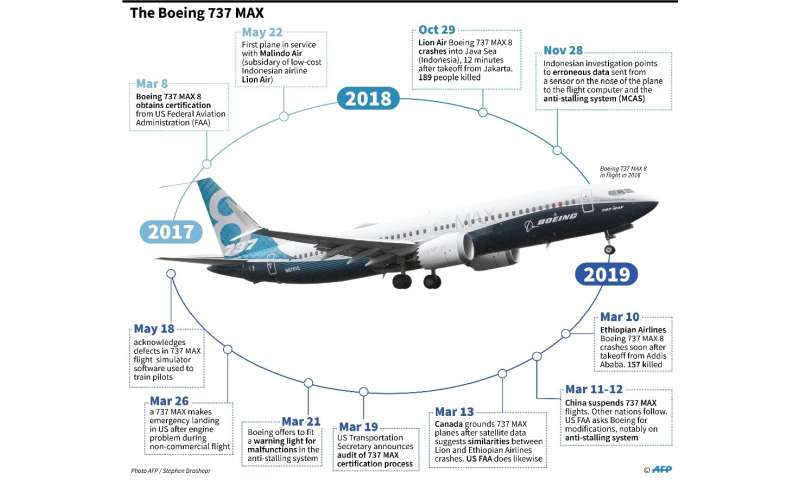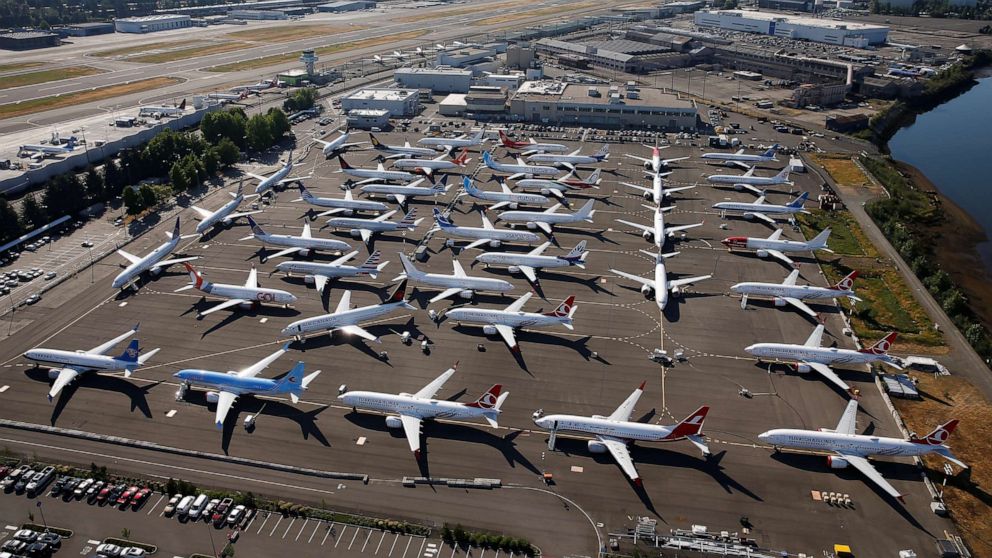 |
| Boeing 737 Max Crash Timeline |
The Case
On October 28, 2018, a Lion Air flight, model Boeing 737 Max 8, was nose diving continually due to the control system malfunctioning. Just a day later, the same jet with a different crew had crashed killing 189 people. Exactly one month later, a pilot requested emergency landing just two minutes after takeoff due to an unknown flight control problem on the same plane model. March 10, 2019, less than five months after the previous crash, another Boeing 737 Max had dove into the ground killing 157 people. Days later the FAA grounded all Boeing 737 Max jets while the company works to fix the automatic flight control system; which at that time had caused over 300 deaths. After extensive research, it was decided that the 737 models would receive new engines that were heavier but more efficient. The company created the Maneuvering Characteristic Augmentation System, or MCAS, to offset the weight of the new engines to avoid the plane from tipping up too far and stalling. In a report of the October 28th crash, the pilots tried more than 20 times to stop the plane's computer from forcing the nose down at 450 mph into the sea. After investigations, emails were found between employees mocking the FAA and bragging about misleading regulators to approve the jets without extensive pilot training. One employee conveyed their guilt for not taking proper precautions; “I still haven’t been forgiven by God for all the covering up I did last year” (Schaper). Another stated, “This airplane is designed by clowns who in turn are supervised by monkeys” (Schaper). The company official responded, “The conversations had are inconsistent with Boeing values, and the company is taking appropriate action in response” (Schaper). Boeing essentially made the FAA see the plane as almost the exact same as previous 737 models which wouldn’t require more training despite the added technology. As of today, the planes are still grounded. The company would like to make the plane known as the safest jet in the sky although it will be extremely difficult for Boeing to change the reputation of these planes. A New York Times journalist has said, “There is a clear lack of engineering culture, aeronautical culture, and a long-term business culture in the board” (McFall-Johnson). Even some pilots have said they do not want to fly the Boeing 737 Max in fears of more malfunctions even if the company claims to “fix” the issue.
Individualism Theory
The Individualism theory states the only goal of business is to profit, the only obligation a person has is to maximize profit for the owner. This duty must be achieved by the employees while abiding by laws. Another requirement is that the company needs to be truthful. The company should be trying to make the best products possible. The company cutting corners to deliver the planes on time and maximize profit follows the guidelines to maximize profit for the owner although they fail to make the best product possible and they failed to be truthful. Lastly, Boeing failed to abide by the law when they misled the FAA about the plane’s technologies. The individualism theory would not approve of the case involving Boeing and their 737 MAX jet.
 |
| Boeing 737 Max Jets Grounded after Crashes |
Utilitarianism Theory
The Utilitarianism theory states that the only thing of intrinsic value is happiness or pleasure. This theory essentially means that the less negative outcomes there are, the better. Unfortunately, Boeing has failed to satisfy this theory given the consequences that resulted: the failed technology that took the lives of many and left multiple employees with a guilty conscience. The company’s failure also caused the employees, the FAA, and the pilots horrific stress while attempting to save these passengers who were on the planes that Boeing produced. The company failed to make anyone happy, let alone the majority of people, and suffered incredible consequences which goes completely against the utilitarianism theory.
Kantian Theory
The Kantian ethical theory principles include acting rationally, allowing and helping people to make rational decisions, respecting people/their autonomy/individual needs and differences, and to be motivated by good will. To act rationally is to act consistent with your own actions and do not consider yourself exempt from the rules. Kant's belief to allow and help people make rational decisions means to give people all the necessary information they need to make a rational decision instead of being misled. To be motivated by good will is to do what is right because it is the right thing to do rather than for money or another purpose. Another main concept of Kant’s theory is his Formula of Humanity which states to never treat others merely as a means but always as ends in themselves. Boeing has not followed the Kantian business ethical theory as it is clear that their conduct has misled the FAA to believe the pilots did not require more training, exempting themselves from the rules which the FAA has set. This also does not let the FAA, nor the pilots, make rational decisions when they are not provided with all of the necessary information to fly this aircraft. Boeing’s motive was most likely driven by money, treating people as a means rather than ends, which also goes against Kant’s belief that the business and people should be motivated by good will as well as the Formula of Humanity.
| Boeing CEO Dave Calhoun |
Virtue Theory
Virtue Theory has a four main ideas such as courage, honesty, temperance, and justice. In this case, Boeing failed to fulfill any of the four main virtues. The company did not show courage as the employees and company sent out a malfunctioning product rather than standing up for what they believe is right and postponing the release date. Boeing was not honest when testing the plane(s) as they lied to the FAA, claiming extra training wasn’t necessary. They were also dishonest in regards to the reason the plane malfunctioned, as they blamed their pilots. This simultaneously exposes that the company was exhibiting injustice and unfairness. Lastly, the company did not show temperance/self-control because they were looking past safety and focused solely on profits.
Justified Evaluation
I believe Boeing has failed their customers, airlines, and everyone who relies on them to build reliable and efficient aircrafts. Overall, people travel on planes often and put their trust into the people engineering them to have safety as a number one concern. Boeing’s immoral actions unfortunately hurt their reputation in a way that will take years or even decades to recover. The company would’ve been much more successful in the case that they took more time to work out the flaws of their system. More tests possibly would’ve revealed the dangers of the system and eventually a conclusion could have been reached to resolve the issue rather than to send out planes which are not ready to be flown by pilots all around the world.
 |
| Boeing 737 Max Crash |
Action Plan
Moving forward Boeing has a lot of work to do to regain the confidence of the people involved. Boeing needs to start by changing their image. A good way to change their image is to release a statement discussing the new goals for the company in response to these crashes. Boeing initially blamed the crashes on the pilots; this reaction was poor for their image by showing they did not take responsibility for their poor design. To start, Boeing should be letting go of the employees who were found to be making unethical comments. Firing these types of employees will hopefully clear that type of thinking from the company. They should also take the pressure off their engineers to have software such as the MCAS done in a such a short time period. They should also hire more engineers to help ensure that any mistake will not go unnoticed. If the system was not rushed or if they had more employees to double check the system, it could have worked properly avoiding the crashes all together. Next, the company needs to come out with a strong statement apologizing to the FAA for misleading them, the airlines who purchased the planes, the families of the pilots they blamed, and the families who lost loved ones on those flights. The company then needs to continue the statement with a plan to fix the issue immediately. They can fix the system by taking away time crunches and adding more employees to double check each piece of the system, as well as initiate training for every pilot to ensure they are aware of the system and how to fly with it. There should be no due date for the fix of the system. Once it is perfected they can begin to put in procedures to more effectively test these different types of systems and ensure they will work properly in every case. Boeing can then release the statistics from the tests that ensure the reliability of the planes whenever they release a new plane. The airplane company will have released the negative thinking from the company, fixed all of the planes, and put in new procedures. Once the public is made aware of these changes they may be able to see Boeing has learned from their mistakes and has taken steps to ensure they will never occur again.
Will Risko
Works Cited
Baker, Sinéad. “The Boeing 737 Max Crashes Have Revived Decades-Old Fears about What
Happens When Airplane Computers Become More Powerful than Pilots.” Business Insider, Business Insider, 17 Feb. 2020, www.businessinsider.com/boeing-737-max-fatal-crashes-revive-fears-automation-planes-2020-2.
Bloomberg.com, Bloomberg,
www.bloomberg.com/news/articles/2020-02-29/faa-tells-boeing-more-training-for-737-max-pilots-may-be-needed.
Chicago Tribune. “Timeline: Boeing 737 Max Jetliner Crashes and Aftermath.”
Chicagotribune.com, Chicago Tribune, 17 Feb. 2020, www.chicagotribune.com/business/ct-biz-viz-boeing-737-max-crash-timeline-04022019-story.html.
McFall-Johnsen, Morgan. “Catastrophic Software Errors Doomed Boeing's Airplanes and Nearly
Destroyed Its NASA Spaceship. Experts Blame the Leadership's 'Lack of Engineering Culture.'.” Business Insider, Business Insider, 29 Feb. 2020, www.businessinsider.com/boeing-software-errors-jeopardized-starliner-spaceship-737-max-planes-2020-2.
Schaper, David, and Vanessa Romo. “Boeing Employees Mocked FAA In Internal Messages
Before 737 Max Disasters.” NPR, NPR, 10 Jan. 2020, www.npr.org/2020/01/09/795123158/boeing-employees-mocked-faa-in-internal-messages-before-737-max-disasters.
No comments:
Post a Comment